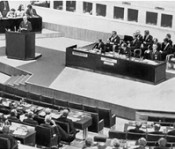
The Conference on Security and Co-operation in Europe Final Act signed
On August 1 1975 in Helsinki, the capital of Finland, representatives of Austria, Belgium, Bulgaria, Hungary, the German Democratic Republic, the Federal Republic of Germany, Greece, Denmark, Ireland, Iceland, Spain, Italy, Canada, Cyprus, Lichtenstein, Luxemburg, Malta, Monaco, the Netherlands, Norway, Poland, Portugal, Rumania, San Marino, Holy See, the UK, the United States of America, the USSR, Turkey, Finland, France, Czechoslovakia, Switzerland, Sweden and Yugoslavia signed the Final Act of the Conference on Security and Co-operation in Europe.
The conference was called by socialistic state-members of the Warsaw Pact and was divided into three stages. The stage I of the conference conducted from 3 -7 July 1973 in Helsinki brought together Ministers of Foreign Affairs. The stage II took place in Geneva from September 18 1973 to July 21 1975 and consisted of sessions spanning 3 - 6 months which attracted delegates and experts, appointed by the participating states. The final stage kicked off in Helsinki on July 30 — August 1 in 1975 and brought together state and political leaders.
Interstate agreements were grouped into several sections.
In the first section regarding the security in Europe, were formulated 10 principles, which specified rules and norms of relations and cooperation between participating states: sovereign equality, respect for the rights inherent in sovereignty; refraining from the threat of use of force; inviolability of frontiers; territorial integrity of States; peaceful settlement of disputes; non-intervention in internal affairs; respect for human rights and fundamental freedoms, including the freedom of thought, conscience, religion or belief; equal rights and self-determination of peoples; co-operation among states; fulfillment in good faith of obligations under international law.
The second part introduced key areas of co-operation in the field of economics, of science and technology and of the environment.
The third section covered the issues, relating to security and co-operation in the Mediterranean.
The forth section included items on co-operation in the field of culture, education, information and other humanitarian fields, taking into consideration principles of interstate relations, among them principles of non-intervention in internal affairs and respect to for the rights inherent in sovereignty.
The original Helsinki Final Act was written in English, Spanish, Italian, German, Russian and French, and donated to the government of the Republic of Finland for keeping it in the Archives. Each of the states-participants received a certified copy of the Act.
An agreement on further steps after the conference specified continuation of a multilateral process, initiated by the All-European conference, which resulted into a series of new agreements, called to prevent interstate conflicts and overcome their consequences. In 1994 the Conference was renamed the Organization for Security and Co-operation in Europe (OSCE).
Lit.: Загорский А. В. Хельсинкский процесс: (Переговоры в рамках Совещания по безопасности и сотрудничеству в Европе 1972-1991). М.,2005; Крохин В. А. Совещание по безопасности и сотрудничеству в Европе // Большая советская энциклопедия. Т. 24. Кн. 1. М., 1976; Организация по безопасности и сотрудничеству в Европе: сайт. URL: http://www.osce.org/; Совещание по безопасности и сотрудничеству в Европе. Заключительный акт. Хельсинки, 1975; Червов Я. Ф. Хельсинкское совещание // Советская военная энциклопедия. Т. 8. М., 1976; То же [Электронный ресурс]. URL: http://militera.lib.ru/enc/enc1976/index.html.
Based on the Presidential Library’s materials:

